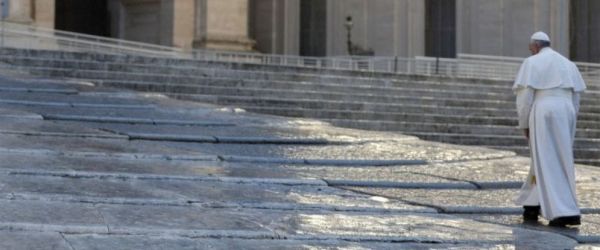Today God continues to weep - with fatherly and motherly tears - before calamities, wars unleashed to worship the god of money, so many innocents killed by bombs, a humanity that does not seem to want peace. It is a strong invitation to conversion that Francis re-launched in the Mass celebrated on Thursday morning, 27 October, in the chapel of the Casa Santa Marta. An invitation that the Pontiff motivated by recalling that God became man precisely to weep with and for his children.
In the passage from Luke's Gospel (13:31-35) proposed by the liturgy, the Pope explained, "it seems that Jesus had lost his patience and also uses strong words: it is not an insult but it is not a compliment to say 'fox' to a person". To be precise he says to the Pharisees who told him about Herod: "Go and tell that fox". But already "on other occasions Jesus spoke harshly": for example, he said "perverse and adulterous generation". And he called the disciples 'hard-hearted' and 'foolish'. Luke reports the words in which Jesus makes a real 'summary of what is to come: "it is necessary for me to go on my way because it is not possible for a prophet to die outside Jerusalem"'. Basically, the Lord "says what will happen, he prepares to die".
But "then immediately Jesus changes tones," Francis pointed out. "After this loud outburst," in fact, "he changes his tone and looks at his people, he looks at the city of Jerusalem: 'Jerusalem, you who kill the prophets and stone those who were sent to you!'" He looks at "the closed Jerusalem, which has not always received the messengers of the Father". And "Jesus' heart begins to speak with tenderness: 'Jerusalem, how often have I wanted to gather your children like a hen her chicks!'". Here is "the tenderness of God, the tenderness of Jesus". That day he "wept over Jerusalem". But "that weeping of Jesus," the Pope explained, "is not the weeping of a friend before the tomb of Lazarus. That is the weeping of a friend before the death of another"; instead "this is the weeping of a father who weeps, it is God the Father who weeps here in the person of Jesus".
"Someone said that God became man so that he could weep for what his children had done," said the Pontiff. And so "the weeping before the tomb of Lazarus is the weeping of a friend". But what Luke recounts 'is the weeping of the Father'. In this regard, Francis also recalled the attitude of the 'father of the prodigal son, when his youngest son asked him for the inheritance money and went away'. And "that father is sure, he did not go to his neighbours and say: 'look what happened to me, but this poor wretch what he did to me, I curse this son! No, he did not do this'. Instead, said the Pope, "I am sure" that that father "went off crying alone".
True, the Gospel does not reveal this detail,' Francis continued, 'but it tells us that when the son returned he saw the father from afar: this means that the father continually went up to the terrace to watch the path to see if the son was coming back'. And 'a father who does this is a father who lives in weeping, waiting for his son to return'. Precisely this is "the weeping of God the Father; and with this weeping the Father recreates in his Son all creation".
"When Jesus went with the cross to Calvary," the Pontiff recalled, "the pious women wept and he said to them: 'No, do not weep over me, weep for your children'". It is the "weeping of a father and mother that God continues to do even today: even today in the face of calamities, of the wars that are waged to worship the god money, of so many innocents killed by the bombs that the worshippers of the idol money throw down". And so 'even today the Father weeps, even today he says: "Jerusalem, Jerusalem, my children, what are you doing?"'. And "he says this to the poor victims and also to the arms dealers and to all those who sell people's lives".
In conclusion Francis suggested that we "think that God became man in order to weep. And it will be good for us to think that our Father God weeps today: he weeps for this humanity that does not understand the peace he offers us, the peace of love".
[Pope Francis, homily at St Martha's, in L'Osservatore Romano 28/10/2016]












